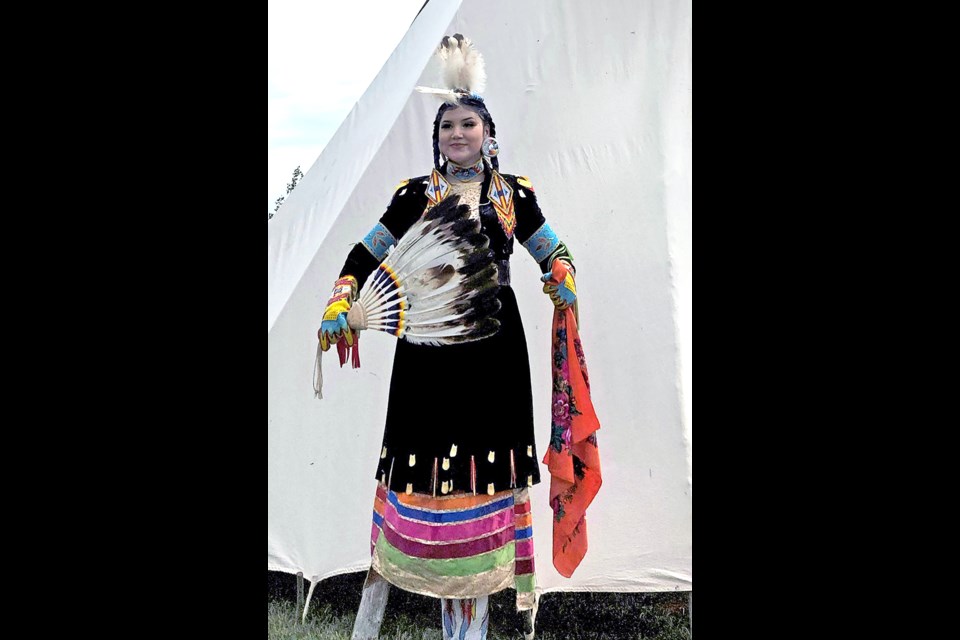SASKATOON — Miss Ahtahkakoop, Kakishew Watisiwkamik Ahenakew, experienced racism growing up whenever she visited other places outside of their reserve. The incidents and words affected her confidence.
That’s why the incoming Grade 12 student at Oskayak High School finds solace whenever she attends a powwow event in full regalia either hosted by her band or outside her reserve. Her name means kind and loving, and body, soul and mind or body of love.
“As a young indigenous youth, I did not believe in myself growing up. Dancing makes me feel safe and in control of the potential I have. When I’m on the dance floor, I think about how happy I’m making my family and ancestors who danced before me,” Ahenakew told SASKTODAY.ca.
That is why she is hoping more Indigenous youth will be encouraged to attend their cultural events and learn more about their traditions the way their ancestors did hundreds of years ago.
“A lot of our youth don’t have access to regalia and what I have experienced. I have met a lot of [our] youth who would love to dance but will never because they don’t have regalia, and they don’t know how to make it,” said Ahenakew, a member of the Ahtahkakoop First Nation.
“More cultural programming should be created to encourage our youth to be proud of who they are by having access to material and dancing lessons.”
She added that knowing your Indigenous roots and the meaning of being one, would pave the way for them to help their communities, a principle she follows.
“It is important we give back to our Indigenous communities. I feel it is important to be a positive role model by giving back. And I achieve this through dance and teaching the younger people of my generation the knowledge I have learned,” said Ahenakew.
Justice for Indigenous people
She said she was also strongly against the decision by several First Nations leaders to give Pope Francis a feather headdress during his week-long visit to Canada. The headdress is traditionally given to chiefs and warriors in Native American culture.
“[It is] something the pope should have not received or been ever seen wearing. A headdress is earned and is very sacred to our people,” said Ahenakew, who added that residential school survivors like some of her relatives are still waiting for justice.
Pope Francis visited Edmonton, Quebec and Iqaluit as part of his pilgrimage of penance where he apologized for the abuses and other atrocities committed by clergy members against Indigenous children who attended residential schools.
She said she wanted no apology from the Pope and the Catholic Church, but rather have the perpetrators held liable for their actions. She grew up knowing that her parents, grandparents and great-grandparents were residential school survivors.
“I want the nuns and the priests who took part in the [cultural] genocide of our people to be held accountable. No justice was given or is taking place,” said Ahenakew.
“The pope may not be directly responsible but he is representing the Catholic Church, which is directly responsible. He is representing all the nuns and the priests who are already not facing any of the crimes or responsibilities they are guilty of.”
Resilient through the years
Ahenakew said that she is proud of how Indigenous People survived all the hardships since colonization and up to the present where they are faced with various social issues.
“I feel very strongly that our people continue to survive amid colonization by society in various forms. However, in reality, [about] 80 per cent of children in foster care in Canada are Indigenous,” she said.
“Clean drinking water is not an option for some reserves. Our men and women and children are still going missing and murdered, and their deaths are deemed suspicious.”
She then turned that resiliency into passion from whatever she’s been doing whether learning about agriculture, modelling, travelling, swimming or just spending time with the people she loves.
“I am very passionate about the land and why certain plants heal us the way they do. I plan to attend university and study agriculture and work my way up to becoming a master grower, specializing in studying traditional medicines,” said Ahenakew.




